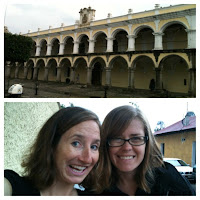I first read these words fresh out of college, at a time when I was slowly recovering from a deep depression/crisis of self after an eye opening and even traumatizing study abroad experience. Horrified at the poverty and injustice I saw throughout Central America, I thrashed from angry to hopeless to numb and back for months after my return.
But I don't count it as a waste. In fact, the very darkness that threatened to envelop me provided the space and silence to actually learn to listen to what my own life was speaking to me. To tune my ears to my true self. To see the values and truths I embody when expectations are thrown out the window.
Out of the darkness, out the rubble, I learned to hear God's voice. I learned to listen to my own voice and learned to gauge and discern my own responses, my attractions and repulsions. Out of the silence I found life. I found hope. I found a job that brought me more joy and purpose than I could have ever imagined. I found a church that fed my soul and helped me to experience God as a personal, present, powerful source of Love within me.
I had learned, to some extent, to let my life speak.
But now, after a year of burnout and tears and agonizing over whether or not I should leave the job that had once brought me so much joy, I find myself at loss for what I really want.
While trying to survive burnout, to end my job well, to live up to all of the responsibilities I had taken on, I somehow forgot how to listen to my own life. I find myself here in Guatemala, fulfilling a long time dream, and yet I still feel hollow, like I've become a stranger to myself.
These last few months I have written, I have banked on, what I think God would or should be telling me instead of what I really hear.
And I've been calling it trust.
I haven't really been hearing from God. Not like I used to. I've been remembering what He told me. I've been rewriting His past promises. Is this being true to myself? How can it be bad to remind myself of God's character, voice, and promises? When does it become untrue? When am I feeding the emptiness, the expectations? When does anchoring myself on the past become an excuse not to listen for His voice today?
In his poem East Coker, T.S. Eliot writes, "There is only the fight to recover what has been lost
And found and lost again and again."
I am fighting to recover what was lost--my joy at work, my sense of purpose, my ability to hear from God, the patience to listen and discern what my own life is telling me. In the clinical sense, it's a journey to overcome burnout and depression; in the spiritual sense, it's a journey to recover my true self, who I am in the eyes of God who loves me.
As of right now, I don't really know what I want. I know what I am SUPPOSED to want, but I don't know what I REALLY want.
I SHOULD want to blog.
I SHOULD want to connect.
I SHOULD want to hear from God.
I SHOULD want to help people.
I SHOULD want to spend my time wisely and be a voice for the voiceless.
I SHOULD want to do something about the poverty and injustice I see around me.
But really I want to disconnect. I don't want to care or get involved or commit myself to anything. Just because I am no longer crying everyday or agonizing over my decision to leave, doesn't mean I am healed. Doesn't mean I am myself again.
I take heart in T.S. Eliot's words, that it's a fight to recover what was lost and found and lost again. It is a journey. It is a process. And this time I know the Healer.
So in the next couple of weeks, this blog may be a little silent as I visit friends back in the States and also take some time to listen--to God and to myself.



.JPG)

.JPG)
.JPG)

.JPG)





.JPG)
.JPG)

.JPG)
.JPG)
.JPG)